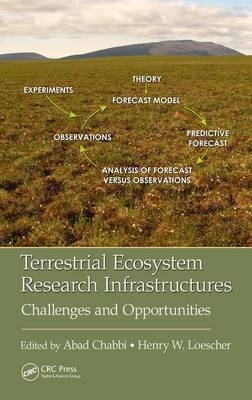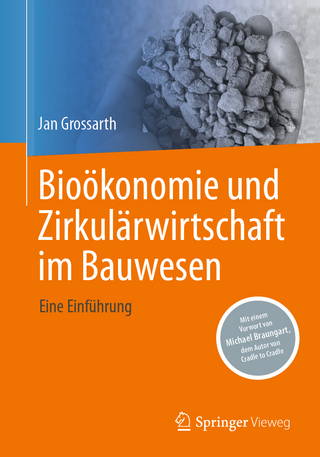
Terrestrial Ecosystem Research Infrastructures
Crc Press Inc (Verlag)
978-1-4987-5131-5 (ISBN)
Dr. habil. Abad Chabbi, Director of Research at the French National Institute for Agricultural Research (INRA) is a plant ecologist and soil biogeochemist. He worked at the Louisiana State University, Baton Rouge, Louisiana; the Faculty of Environmental Science in Cottbus, Germany; the University of Pierre & Marie Curie in Paris, France; and at INRA, where he has been leading the National Observatory for Environmental Research-Agro-Ecosystems, Biogeochemical Cycles and Biodiversity (www.soere-acbb.com) since 2009. His current research centers on understanding the link between soil carbon sequestration, nutrient availability and stoichiometry in the plant–soil system, biodiversity, and the influence that land use management and climate change may have on these dynamics. During his career, Dr. Chabbi coordinated a number of international multidisciplinary projects, chaired and organized numerous international symposiums, and edited books and several special issues of leading international journals. He has presented a number of keynote lectures and seminars around the world. Currently, Dr. Chabbi is a member/expert of the Joint FAO/IAEA Division of Nuclear Techniques in Food and Agriculture, the Chinese Academy of Science, the Czech Science Foundation, the German Research Science Foundation (DFG), the Hercules Foundation (Hercules Stichting), Belgium; the Biotechnology and Biological Sciences Research Council (BBSRC), UK; the Natural Environment Research Council (NERC), UK; and the European commission (DG Research & Innovation and DG Agriculture and Rural Development). Dr. Chabbi is the coordinator of two strategic European FP7 projects, "ExpeER" (www.expeeronline.eu) and "ANAEE" (www.anaee.com), and deeply involved in ENVRIPlus, a cluster H2020 project. Since April 2013, he has also been leading the C2 component of the Ecosystems Task at Group on Earth Observations (GEO). Dr. Henry W. Loescher’s career has been at the nexus of science, engineering, and project development. Formally educated as an ecosystem scientist, he received his PhD and MSc from the University of Florida (forest ecology) and undergraduate degrees from the State University of New York (SUNY) and Vermont State College (environmental science, agronomy, and applied science). His active research projects include determining the biotic and abiotic controls on ecosystem-level carbon, water, and energy balance across a range of spatial and temporal scales, and challenging ecological theory. Dr. Loescher is the Director of Strategic Development in the Battelle-National Ecological Observatory Network (NEON), a first-of-its-kind, continental-scale major research facility that integrates science, engineering, and project management. Dr. Loescher has led multiple NEON Project Science Teams and engineering efforts (instrumentation, mobile deployment, aquatic science, etc.), and he is currently pioneering domestic and international efforts to link large-scale environmental observatories and their "Big Data" to address current and future environmental problems facing society today. As such, he sits on numerous large-project, international advisory boards. Prior to his tenure at NEON, he was at Oregon State University, administrating the DOE AmeriFlux QA/QC Program.
Preface: Goals and Structure of This Book. Editors. Contributors. Section I Ecosystem Research Infrastructures: The Need to Address Global Change and Associated Challenges. Section II A New Generation of Controlled Environment, Field, and Modeling Platforms. Section III New Tools to meet New Challenges: Emerging Technologies for Exploring Unknown Ecosystem Processes. Section IV Data Management and Access. Section V Infrastructure Integration and Perspectives. Index.
| Erscheinungsdatum | 26.05.2017 |
|---|---|
| Zusatzinfo | 18 Tables, black and white; 9 Line drawings, color; 44 Line drawings, black and white; 8 Halftones, color; 7 Halftones, black and white; 17 Illustrations, color; 69 Illustrations, black and white |
| Verlagsort | Bosa Roca |
| Sprache | englisch |
| Maße | 156 x 234 mm |
| Gewicht | 907 g |
| Themenwelt | Naturwissenschaften ► Biologie ► Ökologie / Naturschutz |
| Naturwissenschaften ► Geowissenschaften ► Geophysik | |
| Technik ► Umwelttechnik / Biotechnologie | |
| Weitere Fachgebiete ► Land- / Forstwirtschaft / Fischerei | |
| ISBN-10 | 1-4987-5131-8 / 1498751318 |
| ISBN-13 | 978-1-4987-5131-5 / 9781498751315 |
| Zustand | Neuware |
| Haben Sie eine Frage zum Produkt? |
aus dem Bereich


